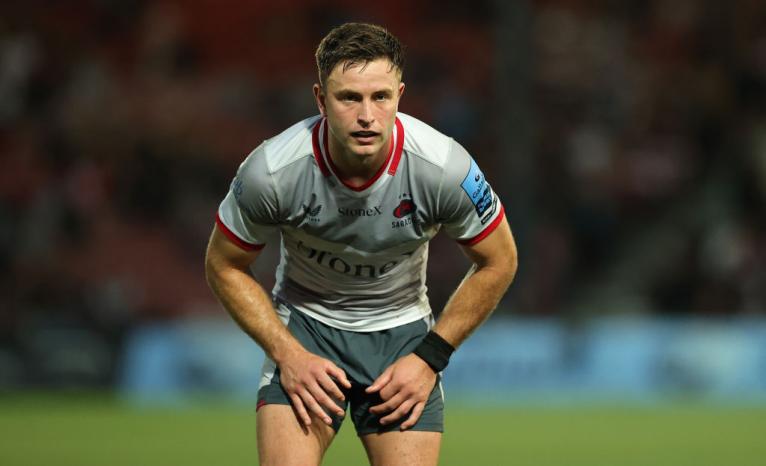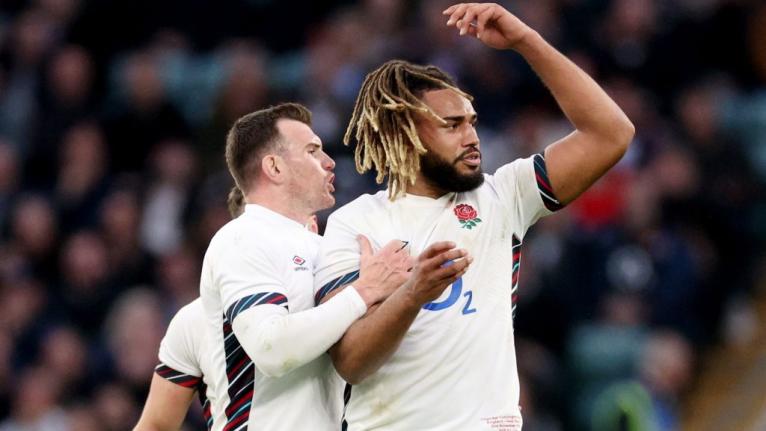Remember the name Fergus Burke. He is is not a big drawcard on the international stage – at least, not yet – but his conundrum of multi-qualification could be central to the future of the game.
Burke is a New Zealander. He was born in Gisborne on the North Island and attended St Paul’s Collegiate in Hamilton before entering the Crusaders academy and studying business at the University of Canterbury. He played for the Crusaders age-group sides before appearing in six games for the national under-20 ‘Baby Blacks’ in 2019.
His progress at senior level has been an uninterrupted march of all red-and-black. He started five matches for the Canterbury NPC representative side before making his Crusaders debut on 14 March 2020 against the Sunwolves. Within three years, he had established himself as the starting 10 at NPC level and a regular at full-back in Super Rugby, and the natural successor to Richie Mo’unga in the Crusaders’ twin-playmaker system.

Burke’s ascent through the New Zealand ranks seemed so seamless and natural it appeared to be only a matter of time before he would be knocking on the door at number 10 for the All Blacks. Then the inexplicable happened, and the worst nightmare for the Kiwi rugby development system.
Although he stayed loyal to the red and black, Burke signed for multiple English Premiership winners Saracens ahead of the 2024-25 season and announced his intention to test out the international possibilities with either Scotland or England. It was the ultimate ironic twist in the ancestry plot, the final reversal in what has become a ‘Cluedo’ game of multi-eligibility.
Although Burke’s father Richard is a New Zealander, his mother Julie is English and his grandfather hails from Scotland. Under World Rugby’s Regulation 8, that qualifies him to represent any of the three nations on a rugby pitch.
The three primary qualifiers are place of birth, parentage or grandparentage, or five years spent playing rugby in another country. Although Burke readily admits “I am driven by international rugby”, his final destination is still unknown. He could be one day replacing Finn Russell in the navy blue of Scotland, or challenging Marcus Smith for the right to wear a red rose on his chest, or cycling all the way home to the silver fern. It is all ‘Professor Plum in the billiards room with the lead pipe’ type guesswork, as things stand.
Burke is not the only player of his generation to seek his fortunes outside New Zealand. Ethan Roots was a contemporary of the young pivot in the Crusaders academy before going on to represent Exeter and England in the UK, while Taine Plumtree was in the same U20s side as Burke before switching allegiance to the Scarlets and Wales. Starting England six Chandler Cunningham-South was born in England but attended Hamilton Boys High School, represented Canterbury U19s and even trained with league’s NZ Warriors before jumping to London Irish and integrating into the England age-group system.

The interest in Burke has been intense, akin to bees buzzing busily around a honey-rich rugby hive. Scotland supremo Gregor Townsend wanted to him to sign for Glasgow Warriors, sparking a tug of war for his signature with Mark McCall’s Saracens. Burke opted for North London on a three-year deal and his loss to New Zealand rugby has been described as “devastating” by former All Black full-back Israel Dagg.
McCall was in no doubt about the quality he was getting.
“We saw a player who was very measured and calm,” he said. “We liked the fact he is not easily hurried or rattled. I also spoke to Scott Robertson, who said he was a player who could command a room and a team. That ability to grab a team and take them to where they need to be is not a quality everybody has.”
If such comments smack of a natural field general and replacement for Owen Farrell, those qualities also happen to be exactly what New Zealand has been missing at 10 since Mo’unga left for Japan. The complete game manager, the navigator supreme with a firm grip on the strategic picture is what Robertson most needs.
Burke would have started for the Crusaders in Super Rugby Pacific had he not suffered an Achilles tendon injury which sidelined him until the back end of the season. As ex-Crusaders and Australia head coach Robbie Deans commented: “If he had been there from the start of the year, the Crusaders would probably have been winning a whole lot more. He understands the game, he is reliable and he obviously has skill. He is just getting started. He is a very good player. I think he is a good recruit. Mark runs a good programme, he’s no slug.”
The Saracens experience promises to round out Burke’s skill set as a first five-eighth in the Andrew Mehrtens or Grant Fox mould. There is never any shortage of the instinctive Carlos Spencer/Frano Botica type in the Land of the Long White Cloud but as Burke himself noted, “the microscope on certain areas of the game here [in the UK] is different to New Zealand.”
The Barnet-based club specialise in developing inside backs who can handle the chores related to the kicking game and the kick-chase game, and the streamlining of Burke’s skills in those aspects was already on view in a recent game against Premiership champions Northampton Saints, played out in very gusty conditions at the StoneX Stadium.
The 10 started with two decisive contributions in the short kicking game within the same sequence of play.
If the new recruit’s kicking in the air was good, the weighting and judgement of Burke’s kicks along the ground was exceptional. The backspin imparted to persuade the ball to stand up off its end in the first grubber, and the assessment of distance into a short in-goal area in the second, are both outstanding skills. That touch was also present on longer tactical kicks along the deck.
The implicit demand of the coaching at Saracens is you have to be adept at all aspect of the kicking game, and Burke was asked to turn from kicker into chaser on a couple of key occasions.
With Sarries’ nine Ivan van Zyl kicking or making play, the 10 has to assume his role as the first inside support runner, to pick up all the crumbs which fall from the table of the kicking game.
Burke was equally good in defence of the kicking game when Northampton looked to turn Saracens’ preferred weapon on their hosts.
The case of Burke is not singular, it is legion. At least three other players who the new Saracens pivot knows from his days in junior rugby in New Zealand have chosen to seek their fortunes in the UK, rather remain in situ.
Burke’s decision to test the waters with either England or Scotland has been thrown head-first into the spotlight by the relative lack of competition for the New Zealand 10 shirt. Burke was seen as the Crusaders’ natural heir to Mo’unga, and that also meant he was in pole position for the next generation of the national team too.
He mattered because he is the kind of first five-eighth New Zealand finds it most difficult to produce from its domestic set-up: the strategic schemer, the man who sees all the angles and all the bigger potential pictures with the detail of a single play. The microscope will naturally turn on why he is available for two other nations under the law of multi-qualification, when he has been developed in New Zealand. A Kiwi product no longer belongs to New Zealand, and that is the way it is. Great credo or greater con it may be, but the free market is here to stay.


Comments
Join free and tell us what you really think!
Sign up for free